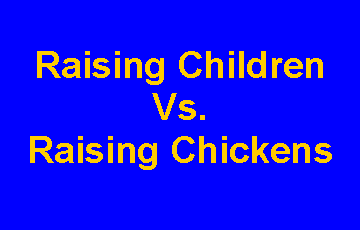


|
The Power of Parents to Teach in Every Day Life
Raising chickens can be relatively easy. Just go to the feed store, buy reservoirs for their food and water and . . . fill ‘em up! . . .You’re done for the week! Aren’t you glad you know that! Now you . . . Even YOU can raise chickens. It’s easy!
As Christian parents we have to be careful that we don’t take that same approach with our children. “Hey kids, get in the car it’s time for Sunday school!” . . . .OK Children’s ministry, here we come...Fill‘ em up and we’re done for the week!
You just can’t raise children like you raise chickens. Deuteronomy tells us how kids learn about God . . .not in classrooms with desks, bulletin boards, workbooks and crafts. Kids learn about God as they experience life.
Fix these words of mine in your hearts and minds . . .Teach them to your children, talking about them when you sit at home and when you walk along the road, when you lie down and when you get up. (Deuteronomy 11:18)
The idea that children learn through experience rather than curriculum is further supported by the science of how our brains develop. Small children have double the brain connections they will have when they are fully grown. You do realize this means young children have double the brain capacity their parents have. Awfully unfair I know but somewhere in the pre-teens, the preadolescent child enters a pruning phase where the brain begins to prune connections very rapidly. The pruning phase goes all the way through adolescence, pruning up to a thousand connections per second! By the time the child is fully grown the brain has pruned away half of the previous connections.
The most important question in this process has to be: How does the brain decide what to prune? If we knew how the brain decided which connections stayed and which were discarded, we would essentially know how to sculpt the brain.
The truth is, we DO know how the brain decides - and it is this: The brain prunes what is not personally experienced. This is why kids have to do homework. They can’t just learn a math formula and remember it without having to work through a lot of problems personally experiencing that math formula.
So, that’s great for Algebra but what about the important spiritual concepts we want to teach our children? Exactly! That is why if we want to truly transfer biblical principles to our children we must understand it does not happen in a classroom environment. The important concepts of our faith need to be woven into the environment of our homes. How do parents do this? They model it, as they encounter life. It has to be part of the daily experience of life.
Let’s take for instance the concept of Grace. I personally think it is the most difficult concept parents have to communicate to their children. Grace, simply put is - “away back.” There are very simple and practical habits parents can model in their home to set up their children to experience Grace. Here are a few:
1. Display Physical Affection
Physical affection communicates acceptance. Human touch is extremely important, babies die without it. Keeping in mind how vital physical affection is, as parents, we need to remember, there are very few people who are allowed to express physical affection to our children. Teachers, coaches and even youth pastors are restricted as to how, if at all, they touch children under their care.
Physical affection is essential to communicating acceptance and grace to children. Our culture communicates that once children head toward their teenage years they no longer want physical affection from their parents. Nothing could be further from the truth! Backing off in physical affection is translated as REJECTION. If a parent begins to sense that their child is backing off physically they may need to be creative in showing their affection. Grab that boy by the arm and tell him you love him. Sometimes teenage guys don’t need you to stop hugging them they just need you to make those hugs a little more burly. In other words, they may not want ‘wimpy’ hugs anymore.
Fathers tend to back off from hugging their daughters when their daughters begin to physically develop. Usually all a dad has to do is remember there are probably dozens of guys who will hug his daughter for him if he’s uncomfortable with it.
2. Pair Correction with Hope
Do you want your child to feel BAD for doing wrong? You may answer that question with a swift “Yes,” until you hear the rest of the question. Or ...Do you want your child to LEARN from doing wrong? Punishment in and of it self is fruitless. Of course you want your child to learn from his wrong doing. In order to do this, every correction needs to be paired with hope. For example, when your child is disrespectful to you, you need to respond with an appropriate negative consequence.
But the correction can be so beautifully framed that it inspires the children rather than shames them. You know the way you talked to me was wrong . . . but the reason it is wrong is not that I am such an important person but rather because eventually, the way you talk to me and act towards me, as your mother/father is the way you will talk or act towards God! That’s why God tells children to respect their parents. And I want so very much for you to talk to God and act towards God with respect.
No matter what your child has done wrong you can have hope for their future. God can redeem any mistake or sin. He can take anyone - in any situation and make a something beautiful and glorifying to Him. Parents who communicate that confidence as they correct are bringing the powerful concept of Grace right into the living room of their home. The best opportunity to experience Grace is when your child feels the least deserving – when they’ve done wrong! What a great occasion to model Grace. This can be done by communicating hope for the child’s future every time you correct.
3. Celebrate Your Child’s Uniqueness
Another way to Model Grace is to - not just accept the fact that your child is different than you - but to admire the differences! There is something wonderful about our children being like us. . . looking like us . . . liking the same food . . . having the same interests. We tend to capitalize on the similarities and discount the differences. Look for the differences in your child and admire them. Your child – his or her personality- is a creation of GOD! Admire it as you would an extraordinary flower or star constellation.
I had two boys and then my baby girl came. I didn’t expect the boys to be like me but I sure expected the girl to be. As her personality blossomed I kept hemming her in, focusing on the things that were the same, quizzing and quizzing her about the things that were different. Are you sure you don’t like Mexican food? Are you sure you don’t like that shirt? It’s so cute on you! I was communicating to her it wasn’t ok to be different than me.
The bible admonishes us to train up our children in their own God –given bent (Proverbs 22:6). I find a lot of left brained logical parents often wring their hands over their right brained, artistic children. The differences between them can cause a lot of misunderstanding and stress. Many times the child ends up feeling like an alien in his or her own home. Parents who decide to accept and celebrate any differences that are not immoral in nature - end up being able to communicate an important element of Grace; it’s ok to be different.
4. Talk about Others with Grace
Talking about other people - is not always gossip; it can actually be helpful as your children learn about the world. When talking about people- especially people who are suffering the effects of sin – it is important to focus on what ‘the way back’ would look like for them. This is an important habit to start when your children are young. As your children get older there may be a girl in your daughter’s class who gets pregnant or a boy in your son’s school who gets caught selling drugs. How will you talk about those kids? What is the way back for them? Don’t they need grace? Don’t they need the answers we, who are Christians, say we have?
Talking about others with Grace assures your child you are safe to talk to no matter what they’ve done. The best hope you have for keeping communication lines is to remember to always paint “the way back” when talking about others. It’s a great way to model Grace.
5. Apologize (GLADLY) When You’re Wrong
Contrary to what you may have heard, apologizing does not cause internal bleeding. Apologizing is a great way to show your children what “the way back” looks like when they’ve been wrong. This communicates that it is ok to be wrong! Being resistant to apologizing communicates that it is irreparably bad to be wrong . . . And if that’s true, we’re all in trouble! Practice apologizing in the mirror . . . Does it hurt? If it does you need to see a doctor!
Apologizing is simple. There are only three basic ingredients (1) I’m Sorry (2) I was Wrong (3) Here is How I Will Work to Not Let It Happen Again. Apologizing gladly is such a great “back- door” way to teach Grace. You should rejoice the next time you are wrong – you have just been handed a golden opportunity to model Grace!
So . . . don’t raise your children like chickens - raise them like the mother eagle does. She stands on the side of the cliff moving her wings, modeling the motions of flight from the time they open their wide little eyes. Your children need to see you live the great principles of God’s Word so they can experience the effects of those principles as you walk through life with them
Parent Talk Radio 811 NE 112th AVE., Suite 106 Vancouver, WA 98684, www.parenttalk.me, 360-909-8827. To order the book - Parenting the Heart of Your Child; email me at: diane@parenttalk.me
|